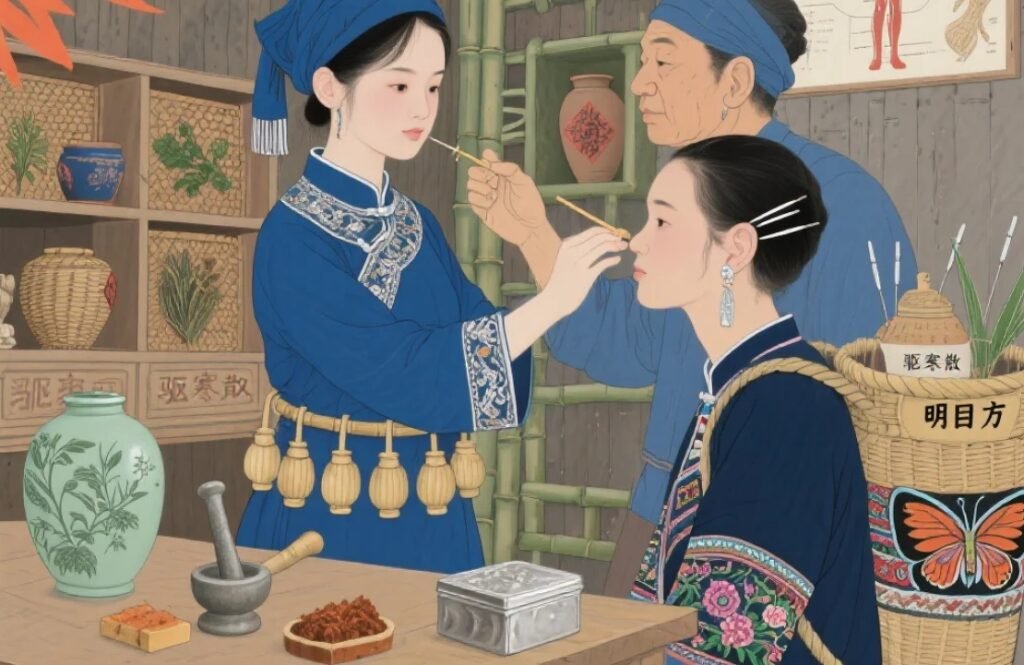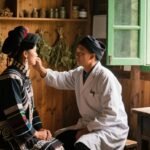Gaji An Mai (Atrophy Syndrome)
Overview:
In Miao medicine, Atrophy Syndrome is called Gaji An Mai. It refers to a condition caused by external pathogens, traumatic injuries, congenital deficiencies, or improper medication use, primarily manifested by relaxation of the meridians, weakness in the hands and feet, muscle atrophy, and other symptoms.
In Traditional Chinese Medicine (TCM), this condition involves the damage of the internal organs and vital essence, leading to a lack of nourishment to the muscles and tendons, causing them to become slack and weak, restricting voluntary movement, and eventually leading to muscle atrophy or paralysis.
In Western medicine, diseases such as infectious polyneuropathy, motor neuron disease, myasthenia gravis, and muscular dystrophy may present similar symptoms of muscle atrophy or paralysis over time, which can also be treated using this syndrome as a reference.
Miao Medicine Classification:
Gaji An Mai is a mild condition divided into two subtypes: Heat-type Atrophy Syndrome and Cold-type Atrophy Syndrome.
Etiology:
The causes of Gaji An Mai include external injuries, pathogen invasion, congenital deficiencies, trauma, or improper medication use.
Pathogenesis:
External pathogens, traumatic injuries, and other factors can damage the body, leading to impairment of the meridians and muscles, obstructing the flow of Qi and blood, and causing imbalances in body fluids. This results in muscle weakness, limited joint movement, and even muscle atrophy or paralysis. Congenital deficiencies or improper medication use can lead to dysfunction of the internal organs, impairing the nourishment of the muscles and tendons, which may result in muscle relaxation, weakness, or atrophy.

Key Diagnostic Points:
Diagnostic Criteria:
Main clinical manifestations include muscle weakness or atrophy.
A history of exposure to external pathogens or internal injuries. The onset may be gradual or sudden.
Recurrent episodes.
Relevant Examinations:
Neurological examination showing decreased muscle strength, or abnormal findings in electromyography (EMG), muscle biopsy, or enzyme tests, consistent with a diagnosis of neuromuscular disease.
Differential Diagnosis:
Meng Chong Jing (Bi Disease):
Bi disease is often caused by wind, cold, dampness, or toxins, or improper care in childhood, or living in a damp environment. External factors such as wind, cold, and dampness invade the body, damaging the blood vessels and obstructing Qi and blood flow. The pain from wind invasion is variable, while cold and dampness may cause severe pain and swelling. Meng Chong Jing is related to fatigue, seasonal changes, and environmental factors like cold and damp weather. Symptoms include fever, migratory pain in muscles and joints, difficulty moving the limbs, and potentially palpitations or shortness of breath.
Gaji An Mai, in contrast, primarily manifests as weakness, muscle thinning, and difficulty moving, often with no pain.
Treatment and Classification:
Heat-type Atrophy Syndrome
Symptoms: Sudden onset with fever, inability to move limbs, gradual muscle wasting, dry skin, irritability, dry throat, bloating, chest tightness, or numbness in hands and feet.
Affected Meridians: Heat-type syndrome.
Treatment Principle: Clear heat and open the meridians; tonify bones and strengthen muscles.
Prescribed Formula:
Dangshen (Codonopsis pilosula) 30g
Maidong (Ophiopogon japonicus) 20g
Shigao (Gypsum fibrosum) 30g
Shihu (Dendrobium officinale) 20g
Boil and drink.
Herb Explanation:
Dangshen: Sweet, neutral, strengthens the middle, tonifies Qi and benefits the spleen.
Maidong: Sweet, cold, nourishes Yin, clears heat from the stomach.
Shigao: Sweet, cold, clears heat and removes toxins.
Shihu: Sweet, neutral, nourishes Yin and clears heat, tonifies the stomach and generates fluid.
Cold-type Atrophy Syndrome
Symptoms: Gradual onset, starting with weakness in the lower limbs, progressively affecting the waist, difficulty standing or walking, shortness of breath, pale complexion, dizziness, tinnitus, nocturnal emissions, or urinary incontinence.
Affected Meridians: Cold-type syndrome.
Treatment Principle: Tonify the liver and kidneys; strengthen the bones and muscles.
Prescribed Formula:
Xue renshen (Panax ginseng) 20g
Baishao (Paeonia lactiflora) 20g
Gouji (Cibotium barometz) 15g
Xuduan (Dipsacus asper) 15g
Boil and drink.
Prevention and Care:
Maintain regular daily routines and keep a calm mind.
Regulate sexual activity and preserve kidney essence.
Eat a balanced diet and avoid irregular eating habits.
Engage in regular physical exercise to promote the circulation of Qi and blood.
Commentary:
Miao medicine believes that Gaji An Mai has various causes, including external pathogens, trauma, congenital deficiencies, or improper medication use. These internal and external factors damage the vital essence of the organs, impairing nourishment to the muscles and tendons, leading to muscle weakness and paralysis. The (used in traditional contexts) emphasizes principles such as clearing heat and opening the meridians, tonifying the bones and strengthening the muscles, and nourishing the liver and kidneys to restore function and (helps maintain) disease progression.


Leave a Reply